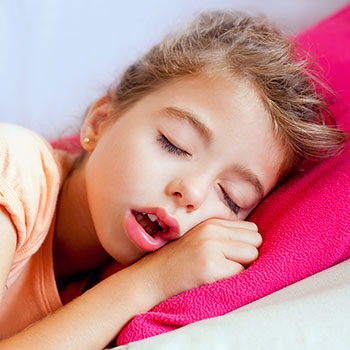My child is snoring, should I be concerned?

Snoring in children is something that should be assessed by a healthcare provider. It may be innocent and related to illness or allergies if it is a rare occurrence. However, if this is a more consistent habit, it could be a symptom of something more dangerous such as Obstructive Sleep Apnea (OSA).
I thought sleep apnea only affected adults, how could my child have this?
Several issues can cause sleep apnea in adults, however, in children, it is most likely caused by natural factors such as large tonsils and narrow airways. In both cases, something is obstructing the airway that causes the person to stop breathing during sleep repeatedly. This, in turn, causes lower levels of oxygen in the body. A decrease in oxygen signals the brain to wake the person so that they can re-open their airway. It is believed that up to 15% of children have some type d of breathing disorder while sleeping.
What are the risks of sleep apnea?
There have been cases of children who are misdiagnosed with behavioural issues such as ADHD or learning disabilities. However, these children may not be getting the required amount or quality of sleep that their growing bodies and brains need to thrive. Children with Obstructive Sleep Apnea also tend to alter their breathing habits out of a need for more oxygen. This altered breathing pattern can also affect the growth and development of their jaw and face. These habits can also affect how your child chews and swallows, which can pose issues with proper nutrition. Some studies suggest children with a snoring habit could be at increased risk for heart disease as adults.
Who should I talk to about my child’s snoring?
Dentists and Dental Hygienists should be able to provide an initial assessment of your child’s airway and tonsil regions. Visual signs your dental healthcare provider may assess are the shape of the mouth, size of tonsils, percentage of the visible airway and overall face size/shape. Your child’s teeth may also show signs of wear, such as shorter length and flat biting surfaces. Since dental care provider spends the most time in the oral cavity, they are often the first people to notice issues. If issues are noted, you will likely be advised to consult with your child’s primary physician for further assessment and possibly referrals to other specialists as needed.
What other symptoms should I look for in my child?
Other symptoms related to sleep apnea could include but are not limited to grinding of teeth, clenched jaws at rest, irregular sleep patterns, restless sleep, bed wetting and day time tiredness. Children with OSA often breathe through their mouths instead of noses. Children who are often viewed as “grumpy” or easily irritable could also be suffering from sleep apnea.
Next time your child is at the dental office, be sure to mention any symptoms you have noticed and ask them for a more detailed assessment of your child’s airway. A good night’s sleep is one of the most critical factors in health and growth.
Contact us to schedule a consultation today.
